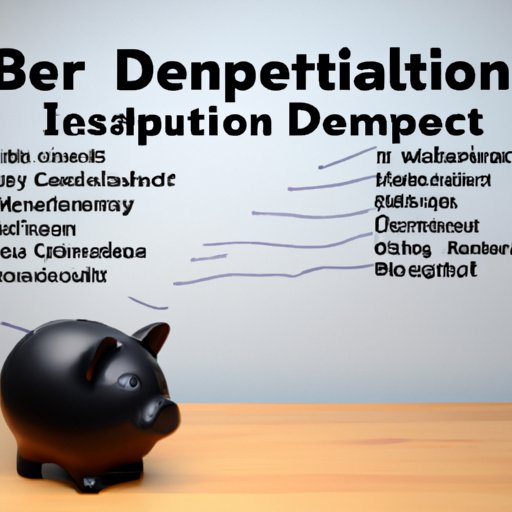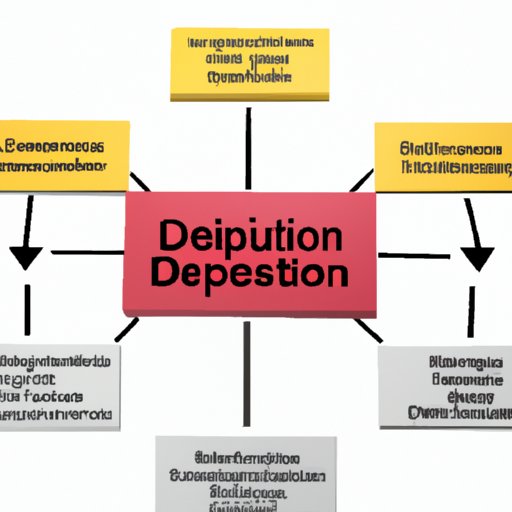Introduction
Debt consolidation is a financial strategy that involves combining multiple debts into one loan with a single monthly payment. It can be a great way to manage your debt by reducing your interest rate and simplifying your payments.
The problem of debt is a major issue among many Americans. According to the Federal Reserve Bank of New York, total household debt in the United States has reached $14 trillion as of December 2020. This includes mortgages, student loans, credit card debt, auto loans, and other types of consumer debt.
A Step-by-Step Guide to Debt Consolidation
Debt consolidation can be a great option for those who are struggling with their debt. Here is a step-by-step guide to help you understand how it works:
1. Researching Different Options
The first step in debt consolidation is to research different options. There are various types of debt consolidation available, such as balance transfer cards, personal loans, debt settlement programs, and debt management plans. Each option has its own pros and cons, so it’s important to do your research before making a decision.
2. Calculating Your Debts
Once you’ve done your research, you’ll need to calculate your debts. Make sure to include all of your outstanding balances, including interest rates and minimum payments for each account. This will give you a clearer picture of your overall financial situation.
3. Choosing a Plan
Once you have a better understanding of your debts, you can choose a debt consolidation plan that best suits your needs. Consider factors such as the interest rate, repayment period, and fees associated with the plan before making a final decision.

Exploring the Benefits of Debt Consolidation
Debt consolidation can provide several benefits, including:
1. Lower Interest Rates
One of the main advantages of debt consolidation is that it can help you get lower interest rates on your debt. By consolidating your debt into one loan with a lower interest rate, you can save money in the long run.
2. Easier Payment Management
Debt consolidation also makes it easier to manage your payments. Instead of making multiple payments to different creditors each month, you can make one single payment to one lender. This can help you stay organized and keep track of your payments more easily.
3. Improved Credit Score
Debt consolidation can also help improve your credit score. By paying off your debt quickly and on time, you can boost your credit score over time. This can be beneficial if you’re looking to take out a loan or apply for a new credit card.
The Pros and Cons of Debt Consolidation
It’s important to consider both the pros and cons of debt consolidation before making a decision. Here are some of the advantages and disadvantages of this approach:
Pros
- Lower interest rates
- Easier payment management
- Improved credit score
- Reduced stress and anxiety
Cons
- Fees associated with debt consolidation
- Potential for higher overall payments
- Risk of accumulating more debt
- Possibility of reduced credit score

An Overview of Debt Consolidation Processes
There are several different debt consolidation processes available, including:
1. Balance Transfer
A balance transfer is a type of debt consolidation where you transfer your existing credit card balances to a new card with a lower interest rate. This can help you save money on interest and simplify your payments. However, there may be fees associated with balance transfers, so it’s important to read the fine print before signing up.
2. Debt Settlement
Debt settlement is another form of debt consolidation. In this process, you work with a debt settlement company to negotiate with your creditors to reduce the amount of debt you owe. This can be a good option for those who are unable to make their payments on time. However, it can also have a negative impact on your credit score.
3. Debt Management
Debt management is a process where you work with a credit counseling agency to create a plan to pay off your debts. The agency can help you set up a budget, negotiate with creditors, and create a payment plan that works for you. This can be a good option for those who are struggling to pay off their debts.
4. Bankruptcy
Bankruptcy is the last resort when it comes to debt consolidation. It involves filing for bankruptcy protection to eliminate or reduce your debt. This can be a difficult process, so it’s important to consult with a lawyer before making a decision.
How to Choose the Right Debt Consolidation Option
When choosing a debt consolidation option, it’s important to consider your financial situation. Here are some tips to help you make the right decision:
1. Consider Your Financial Situation
Take a close look at your finances to determine what debt consolidation option is best for you. Think about your income, expenses, and debt load to determine which option is most suitable.
2. Analyze Your Monthly Payments
Look at your current monthly payments and compare them to what you would pay with a debt consolidation loan. This will help you determine if the loan is worth it in the long run.
3. Compare Different Options
Compare different debt consolidation options to find the one that offers the lowest interest rate and best terms. Be sure to read the fine print and ask questions to make sure you fully understand the loan before signing up.

Common Questions About Debt Consolidation
Here are some common questions about debt consolidation:
What is the Best Way to Consolidate Debt?
The best way to consolidate debt depends on your individual financial situation. It’s important to research different options and compare them to find the one that’s best for you.
Is There a Limit to How Much I Can Consolidate?
Yes, most lenders have limits on how much debt you can consolidate. Be sure to check with your lender to find out their specific limits.
How Long Does it Take to Consolidate Debt?
The amount of time it takes to consolidate debt varies depending on the lender. Generally, it can take anywhere from a few weeks to a few months to complete the process.
Conclusion
Debt consolidation is a powerful tool for managing debt. It can help you lower your interest rates, simplify your payments, and improve your credit score over time. However, it’s important to carefully consider the pros and cons of debt consolidation before making a decision.
By researching different options, calculating your debts, and comparing different plans, you can find the right debt consolidation option for your needs. Keep in mind that the process can take several weeks or months, so it’s important to be patient and stay organized throughout the process.
Debt consolidation can be a great way to manage your debt and get back on track financially. With the right approach and a little bit of patience, you can get your debt under control and start living your life again.
(Note: Is this article not meeting your expectations? Do you have knowledge or insights to share? Unlock new opportunities and expand your reach by joining our authors team. Click Registration to join us and share your expertise with our readers.)
